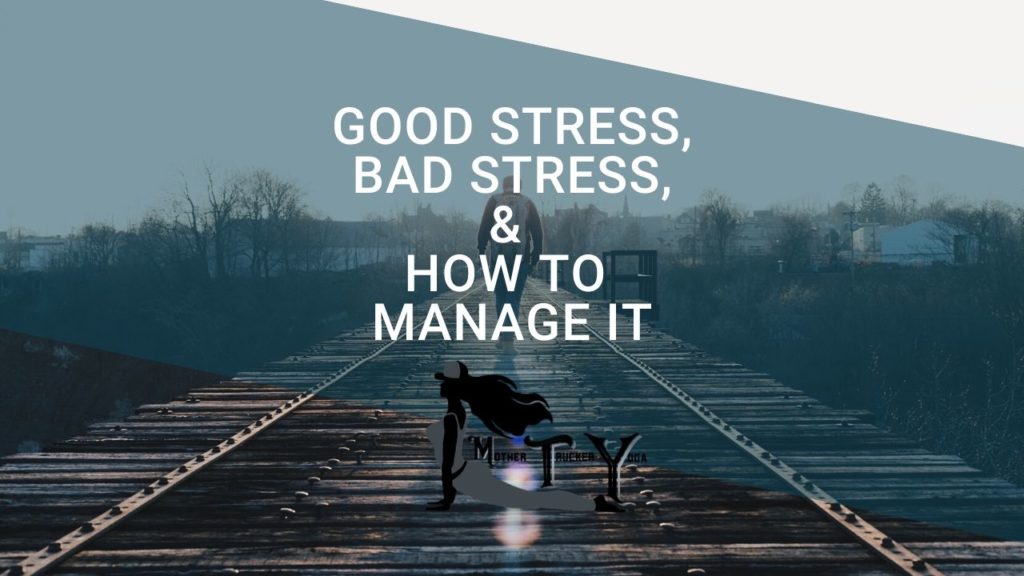How to manage stress is not something we are “taught”. But everyday life can be stressful. Good stress, bad stress. Stress, stress STRESS. It’s everywhere.
Job demands, relationships, life events, and social media drama are daily occurrences. Moreover, it can begin to feel like this is just how life is supposed to be, coupled with the stresses as a truck driver. These things can often have you feeling like you are traveling down a never-ending, bumpy road called LIFE. It’s easy to see how stress can suck you in and not let you go.

While stress can help some people perform under pressure, too much bad stress can negatively impact a person’s mental and physical health. It’s common for most people to focus on the negative side of stress, but sometimes stress can be a good thing. Good stress can motivate a person and help them achieve more goals. BUT how can a person tell the difference between good stress and bad stress?
Understanding Good Stress vs. Bad Stress
Good Stress
Good stress, often called eustress, is stress that pushes a person to accomplish more. It helps a person achieve those hard-to-reach goals. Good stress also helps a person learn new things, adapt to change, and engage in creative thinking. In a situation where a person is experiencing good stress, they always have control over the outcome of the issue.
Bad Stress
Bad stress, often referred to chronic stress, can slow a person down and prevent them from doing the things that they need to do. It can often lead us down a winding road of helplessness and despair. Bad stress can be things like staying in an unhealthy relationship long-term, living with a difficult person, continual high paced (stressful) workplace, taking on too many things, and continuously unable to complete them. That is continually saying “yes” when you should be saying “no.” When the body feels like it is under too much bad stress, symptoms such as excessive sweating, anxiety, headaches, and rapid breathing begin to appear.
Managing Stress
I encourage others to live a life where they can stay grounded, focused, balanced, and content. However, sometimes I fail to implement these strategies into my own life. I take on too many things, try to please everyone else, and neglect my health and self-care. It’s a downward spiral, and before I know it, my daily life is fueled by bad stress. Can you relate?
Unfortunately, stress is inevitable. It’s a part of daily life. The good news is that stress IS manageable. To manage the stress in your life, you must relax your body and mind. You must balance the scale and know what your triggers are and what to do to bring yourself back to center.
What is center? Center is when you feel like you are on point when you feel like you are handling life and thriving. When you sleep well and respond to life’s circumstances with ease, most people that meet with anger or hate are dealing with something much more profound—usually, sadness or hurt. And in not dealing with those emotions and challenges brings about bad stress and unwarranted responses that hurt rather than help.
Here are three ways to manage stress so that you can live a healthier, stress-managed life.
1. Take a Break
When I say take a break, I don’t mean a break where you are scrolling through social media or watching videos on your phone. I’m talking about unplugging and walking away from all the distractions in your life. Do something for five to fifteen minutes that requires very little of you other than for you just to be yourself and to be present. Sit outside, take a quick five or ten-minute walk, play a quick game of “Go Fish” with the kids, or engage in meditation. And sometimes that break is to help your body to heal. Make sure you take a time out so your physical body can reset and heal as well.
2. Put Away Your Electronic Devices
If you think about it, we live in a world where we have immediate access to almost anything we need. Instant information is available to use with the simple touch of an app on our phones or tablets. But at what expense? Being over connected has created a massive epidemic in our world today. An epidemic that has produced anxious stressed and technology-addicted teens and young adults that are not ok with doing nothing or being alone. The only way to break that cycle and bring more Zen into your life is to put the electronic devices down and slowly back away. Have a no-phone rule at the dinner table, limit screen time, keep your device in your pocket or bag when you are out with friends–whatever you need to do to stop looking at your device–do it. You’ll be glad you did.
3. Be Positive
Is your glass half-empty or half-full? If it’s half-empty, it’s time to change your thinking. Keeping a positive attitude, shifting your negative thoughts to positive ones, and keeping your self-talk encouraging are great ways to reduce stress. For example, instead of thinking, “I can’t believe I made the same mistake AGAIN,” think, “Everybody makes mistakes. It’s ok. It is something that I can fix.” Developing an attitude of gratitude toward the people, things, and events in your life is also an excellent way to reduce stress. Write it down or take time to tell the people in your life that you appreciate them–trust me; it goes a long way! Finally, smiling and laughing also helps to reduce stress. I guess laughter is the best medicine.
Utilizing these three tips will help you begin to walk down the path of life a little less stressed and more positivity.
